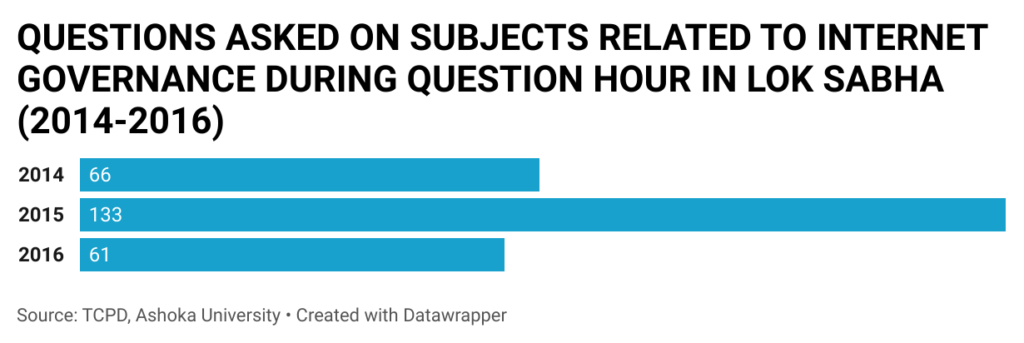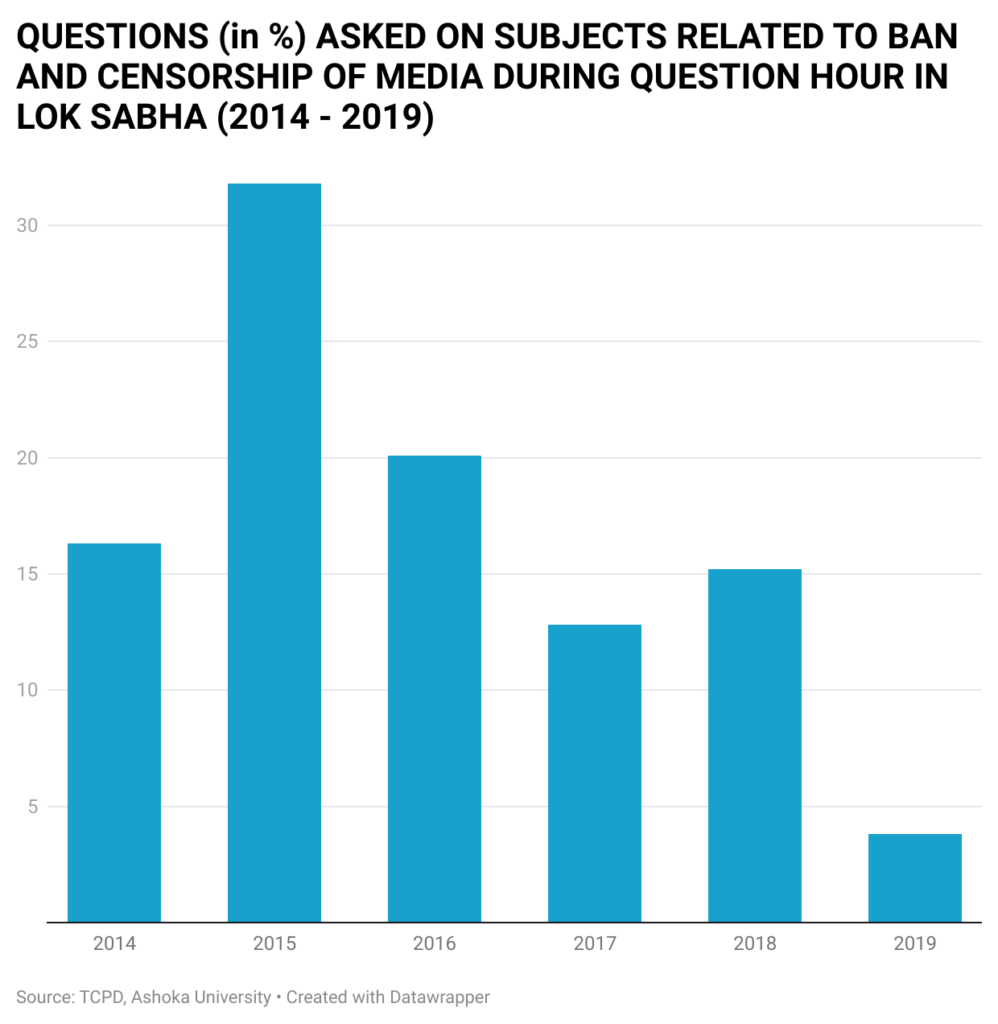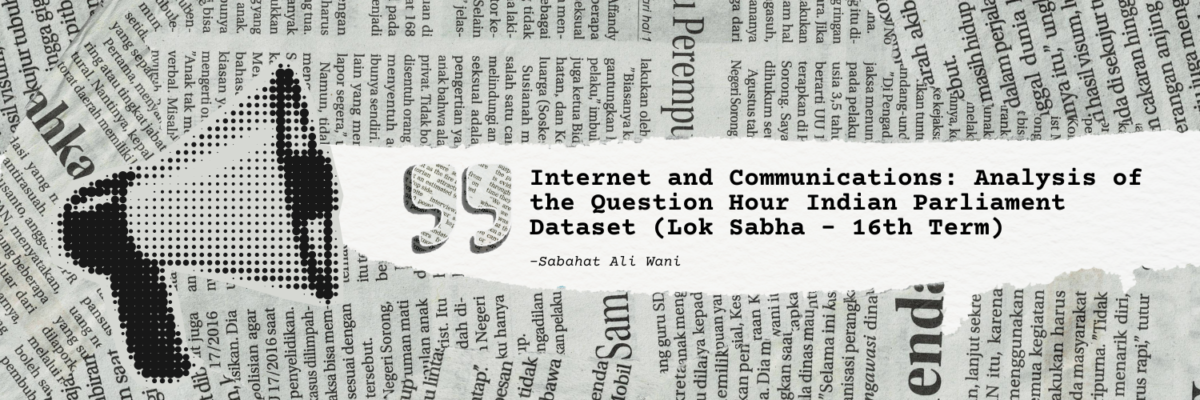In the current state of affairs, the internet and communications significantly impact the reshaping of the political sphere as people change their behaviour and choices according to the information available online.1 In India, citizens have been proactively using cyberspace to show their engagement with electoral politics. On the other hand, digital communications have also been used as the primary campaigning tool by political parties to disseminate their agendas to their target audience(s). In the General Elections of 2004, “the electronic messages were sent on the internet and mobile phones”,2 and even that, created a buzz in the public sphere. In the current climate of enveloping politicisation, media, especially social media, has given space to electoral debates more than ever before as “social media has been increasingly used by Indian political actors for routine political communication between elections to provide unmediated and direct communication to connect leaders and citizenry, and to re-energise the political landscape in the country”.3
To highlight the political significance of ‘internet and communications’ within the political sphere, especially in electoral politics, this article would identify and analyse the key themes discussed regarding the developments within this category in the Question Hour of the Indian Parliament during its 16th term (2014-2019).
- Question of Internet Governance:
Internet governance is defined as the “development and application by Governments, the private sector and civil society, in their respective roles, of shared principles, norms, rules, decision-making procedures, and programs that shape the evolution and use of the Internet. It covers activities such as the development and coordination of technical standards, the operation of critical infrastructure and public policy issues”.4 Between the years of 2014 to 2016, the questions discussed (Figure 1) on the subject of internet governance revolved around the: (i) mechanisms for national and global internet governance, (ii) internet users, demography related to the usage, and its impressions on transforming India into an internet economy, (iii) regulation for the censorship of the internet and its impact on the relevant laws and acts and, (iv) issues about internet connectivity, privacy, disruptions, shutdowns, subscribers, content and speed.5
Figure 1

- Question of the Internet in Rural Areas:
The subjects discussed under the umbrella of internet governance do not exist in a vacuum and have a considerable impact on civic engagement in electoral politics. For example; taking the case of the provision of internet facilities, the Question Hour trends (2014 to 2019) show that the matter of ‘internet and broadband connections in the rural areas’ was dominantly discussed, in conjunction with—its state-wise provisions, government funding, the growth of internet subscribers in rural areas, promotion of IT (Information Technology) services in the villages and so on.6
Putting things into perspective, network and internet connectivity is a highly political arena. Better, consistent and affordable access to internet facilities in rural areas would allow the citizens to know more about their representatives; hence, they would make an informed decision during elections. In states like Karnataka, people of Kudaruru Zilla Panchayat in Sagar Taluk launched a “No Network, No Voting” campaign and “resolved to boycott the coming Zilla and Taluk Panchayat elections demanding better internet connectivity”.7 The Economic Survey (2022 – 2023) as presented by the Minister of Finance and Corporate Affairs, Nirmala Sitharaman on January 31st stated that “penetration of the internet in India’s rural areas grew an impressive 200 per cent between 2015 and 2021, compared to the 158 per cent growth clocked by urban areas in the same period”.8 Therefore, in upcoming elections, such penetration would affect electoral politics as well as the voter’s behaviour in rural areas.
- Question of Censorship:
Apart from the issues related to ‘internet and broadband connections in the rural areas’, the subject of ‘ban and censorship of media’ also influenced the discussions in Question Hour (16th Term). Between the years 2014 to 2019 (Figure 2), about 20% of the questions on the ‘ban and censorship of media’ were asked in 2014, followed by over 30% in 2015.9 The questions were directly asked about the misuse of social media, restrictions and regulation on/of print and digital media, social media policy, security clearances, the safety of media persons and, other questions based on the users, content, rumours and ban on media. In current times, the concern about banning and censorship is widespread and has an enormous impact on how people perceive or think about the character of a specific political party and react to the same through various political activities or channels.
Figure 2

Conclusion:
Overall, it is evident that the internet and communications are a highly political arena and are used by political parties and citizens to share information, develop narratives and enhance discussions. With digitisation receiving support from many governmental and non-governmental stakeholders, the impact of this sphere is going to increase on elections—use in campaigns, voter behaviour and choices, more electoral penetration in rural areas, etc.
About
Sabahat Ali Wani is currently working as an intern at the Trivedi Centre of Political Data, Ashoka University. She has completed her Bachelor’s in Political Science and History from Miranda House, University of Delhi.
Acknowledgements
I would like to extend my sincere thanks to Poulomi Ghosh, my supervisor at TCPD and also, express my deepest appreciation to the entire TCPD team for being extremely supportive.
References:
- Lewis, James Andrew. “A Short Discussion of the Internet’s Effect on Politics.” Center for Strategic and International Studies, 29 January 2021, https://www.csis.org/analysis/short-discussion-internets-effect-politics. Accessed 4 February 2023.
- K, Rahul. “Use of New Media in Indian Political Campaigning System.” Longdom Publishing SL, 2016, https://www.longdom.org/open-access/use-of-new-media-in-indian-political-campaigning-system-35619.html. Accessed 4 February 2023.
- Rao, Anuradha. “How did Social Media Impact India’s 2019 General Election?” Economic and Political Weekly, 27 December 2019, https://www.epw.in/engage/article/how-did-social-media-impact-india-2019-general-election. Accessed 4 February 2023.
- “What Is Internet Governance?” Internet Governance Project, https://www.internetgovernance.org/what-is-internet-governance/. Accessed 4 February 2023.
- TCPD Question Hour Indian Parliament Dataset, 16th Term (2014 – 2019), Trivedi Centre for Political Data, Ashoka University.
- TCPD Question Hour Indian Parliament Dataset, 16th Term (2014 – 2019), Trivedi Centre for Political Data, Ashoka University.
- “We won’t vote until you give us internet connectivity, say villagers.” The Hindu, 16 July 2021, https://www.thehindu.com/news/national/karnataka/we-wont-vote-until-you-give-us-internet-connectivity-say-villagers/article61441033.ece. Accessed 4 February 2023.
- Zaidi, Tarab. “Economic Survey 2023: India clocked 200% increase in rural internet subscriptions in six years.” Business Today, 31 January 2023, https://www.businesstoday.in/economic-survey/story/economic-survey-2023-india-clocked-200-increase-in-rural-internet-subscriptions-in-six-years-368250-2023-01-31. Accessed 4 February 2023.
9. TCPD Question Hour Indian Parliament Dataset, 16th Term (2014 – 2019), Trivedi Centre for Political Data, Ashoka University.
Disclaimer
This article belongs to the author(s) and is independent of the views of the Centre.

